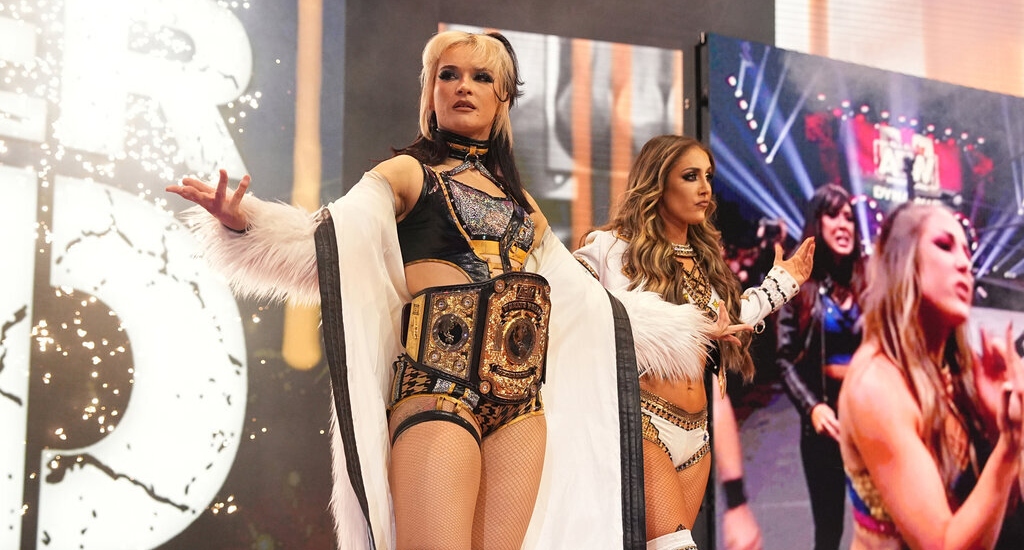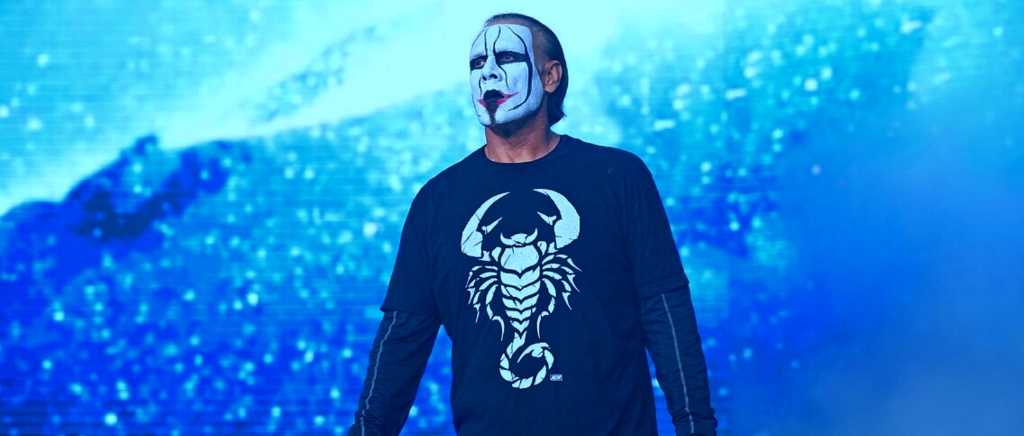The very first image Mikey Rukus can remember from his childhood is watching an irate Jimmy ‘Superfly’ Snuka attack Don Muraco after the bell at Madison Square Garden in 1983. That set up one of the signature moments in professional wrestling history — with Snuka’s splash from the top of a steel cage — but it also set in motion Rukus’s collision course to become All Elite Wrestling’s first music producer and director.
Rukus had a relationship with music from an early age, learning to play guitar, joining the marching band, and trying out different styles of music after high school. When he explored a career in music production for sports, he saw WWE as a gated community, so he tested the waters in MMA.
“I wasn’t even that good at it back then,” Rukus tells Uproxx Sports. “I was just kind of taking a stab at it, seeing how this would work. But being able to learn with every interaction how to decipher what they’re looking for and being able to provide a solution for a problem that they have, there’s a lot of fulfillment within that.”
Rukus networked with amateur and regional fighters as a side hustle while working as a retail manager. Within the first two years, he was putting in 60 hours a week at the store and working 20-30 hours a week on his music. That work paid off, as he had his music featured on the UFC, later on NBC Sports, and did a few independent films.
When AEW was officially formed, Rukus saw the promotion’s development as a perfect fit. He managed to find connections within the promotion and got a trial run developing a theme for Nyla Rose. He submitted that within 24 hours, and weeks later joined the company.
Over the years, Rukus has learned to become patient with the adoption of the theme songs he creates. That wasn’t necessarily the case when he first joined the company though.
“I think the most difficult part for me was not beating myself up as much as I did in the beginning,” Rukus says. “I used to feel like when I first got here, like the fans are going to hate me, they’re going to hate the music, and I’m going to be looked at as a joke, and I’m going to wake up tomorrow and I’m not going to have a job. That was my biggest hurdle in the very beginning.”
For Rukus, the turning point in his time with AEW came with Sting’s arrival.
“When you look at it in terms of iconic figures in our sport, (Sting is) definitely up there,” Rukus says. “Having that opportunity to create something and make a statement and know that whenever he’s on screen, you’re going to get time, it’s going to have time to bake into people’s psyche. It’s going to have time for people to consume and really connect and to tell that story. So I think that knowing that was going to be the case, I guess you could say all the stars aligned for that one. It changed things for me. Knowing that if I can make something at this level, at this moment, I know that I can do that for everybody. And then when we had it happen again with Adam Cole, it’s probably one of our biggest songs to date.”

Now he understands that each moment is like catching lighting in a bottle that needs the right talent, the right platform, the right time, and the right music to work. Waiting to see fan reactions isn’t as much nerve-wracking anxiety as it is excitement to see how they connect with the music and character.
“With Steve Austin’s music, the glass breaking didn’t become a thing for a while, but it was allowed to be cultivated to the point where people were anticipating it. You programmed the crowd to anticipate what’s coming and then you get the reaction that you get, but all of those things have to kind of tie into it,” Rukus says.
“You want every track to be as great as it possibly can, but I don’t focus on like this is going to be the one, this is going to be the thing that is the next big thing. When you try to do that, then you end up falling short all the time. You have to allow the process to cultivate, and a lot of it again, comes down to the sum of all parts working as one.”
With time also came Rukus’s ability to separate his work from the legendary Jim Johnston. Like most kids who grew up in the golden era of wrestling, Rukus points back to the “godfather, the first, and the greatest” when it comes to Johnston’s influence on pro wrestling’s iconic theme songs. Rukus, however, says he’s moved on from being in Johnston’s shadow as he’s carved out his own unique body of work.
“You have to get to a point to where it’s like, I’m not trying to be this person. I’m just trying to tell the best stories that I can. And then later on, when people look back at the library of work I’ve done, then they can use that to compare and contrast,” Rukus says.
“I got rid of that mentality of feeling like I was in somebody’s shadow a long time ago. And I want to say maybe it was with the Sting thing, a lot changed for me personally in how I approach things after that night. And again, I felt like I was home. I have cemented my own individuality. Now I can move forward and just focus on telling the best stories possible. And being innovative and just learn as much as I can continuously.”

Firmly in his groove with AEW, Rukus has had a stellar 2023. As he rounds out the year, he’s posted chart toppers around the world, from Adam Cole’s theme reaching No. 1 in Panama to his personal favorite, the HayterRave becoming a top hit in the U.S., Canada, and Ireland. But without a doubt the thing he’s most proud of from the last year is rolling out the 30 minute HayterRave.
So it’s late- but I have a few minutes. I’ve always followed iTunes charting systems bc they track in real time in several categories globally. These are some of the notable achievements that AEW Music has hit in 2023.
A thread 🧵🪡
— RUKUS (@MikeyRukus) November 29, 2023
“It’s so crazy because Britt Baker and I were kind of chatting back and forth and we were talking about mashing up their themes, Jamie’s and her theme. And we were talking about whether that would work on TV because really, they’re two, even though they’re a team, they’re two separate entities that should be receiving two separate pops. So we decided to hold off on it, but I thought there’s something here,” Rukus says.
“And then Jamie was wrestling one night and I just had a throwaway tweet maybe it’s time to make a 30 minute rendition of Jamie Hayter’s theme. And that tweet just went crazy. I was like, well, maybe we have something here. So I decided I don’t want to just loop Jamie Hayter’s theme for 30 minutes. Let’s go back into our library and see how we can reimagine some of the more popular songs that we have in AEW original music. I had never done anything like that before, ever, and it was like four months worth of work. That by far was my big achievement for this year. And there’s been talks of possibly a Part Two. I won’t get too far into it, but I’m considering some different approaches for Volume Two.”
What if I went live and did a session where we took Jamie Hayter's theme and did a rave remix, tossing in parts from AEW themes of your choice?
— RUKUS (@MikeyRukus) July 1, 2022
Looking back, Rukus never thought there would be a spot like this growing up. But as he approaches 2024, he’s grateful for the opportunities and is constantly looking to expand his reach outside of AEW programming.
“I really want to focus on the expansion of our music base,” Rukus continues. “Not just the actual music that you hear on wrestling programming, but being able to hear it in different mediums, whether it be sporting events, television ad campaigns, things like that. I want to be able to impact education. I want young people to be inspired by the music that we create, I want to be able to inspire people that way and, and just really really hit at the heart of what storytelling is in an audio format.”







